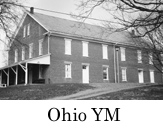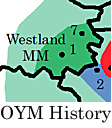The following is the entire text of the memorial:
A Memorial for
Thomas C. Cooper
a Minister of the Gospel,
of Middleton Friends Meeting,
Ohio Yearly Meeting
1911–1997
This memorial was read and approved to be printed by the Representative Meeting of Ohio Yearly Meeting of Friends held at Salem Meeting House the 17th of Eleventh Month 2001.
Introduction
About a decade ago, Wynn Cooper (a grandson of Thomas Cooper) happened to awaken just before sunrise. He looked out his window and noticed that a light was on in his grandfather’s house. A few days later Wynn woke up early again, and again he noticed a light in his grandfather's house. Not knowing the reason, Wynn decided to ask about it. His grandfather said that he liked to rise before sunrise so he could have a time of uninterrupted prayer; this was the time he especially liked to pray for his family.
Thomas Cooper will be remembered as a minister who loved children. One year during the 1990s Thomas came to speak to Junior Yearly Meeting and Young Friends. He took them into the Collection Room at the School and said that while he was working there the floor tiles were laid in that room. One of the tiles was mislaid, and he asked the young Friends to search for it. We will always remember when David Rushby found that mislaid tile. Thomas managed to prick the interest of the young Friends and then shared a spiritual message with them.
Thomas Cooper had complete faith that Christ Jesus controlled all circumstances in life. One of his frequent topics of ministry was "Let Go and Let God Let." Thomas felt that God was always available to help right the wrongs in life. Often during his ministry Thomas would be so reached by the divine hand that he would be brought to tears, which made an impression on Friends present.
Early Life
Thomas Charles Cooper was born on the 15th of First Month 1911 to Walter M. and Anna B. (Blackburn) Cooper of Middleton, Ohio. Walter and Anna had four other children: Sarah (who married Howard Stratton), James (married Bertha Hall), Wilmer (married Emily Haines), and Joseph (died as an infant).
Thomas was raised in a thriving and close-knit Wilburite family. His parents were Elders at Middleton. Walter Cooper was one of a group of Orthodox Friends who migrated from Chester County, Pennsylvania, to Columbiana County around 1900. Three of Walter's siblings moved to Ohio with him: his brothers Cyrus and Harry and his sister Frances (who came with her husband Harry Moore; Cyrus Cooper and Harry Moore were recorded ministers). Most of these Eastern Friends came from West Grove Meeting, which had some of the strongest Wilburite sympathies in the Delaware Valley. However, they were concerned about the encroaching progressive ideas of the leaders of the Orthodox Friends in Philadelphia Yearly Meeting.
Thomas attended the Middleton Friends primary school and then the Friends Boarding School. Thomas served on his first Yearly Meeting committee in 1937, when he was appointed to assist in promoting the orderly gathering of Friends on public meeting days during yearly meeting. This appointment was usually granted to the younger Friends in the Yearly Meeting.
After school, Thomas began working for Robert Moore in a trucking business at Damascus, Ohio. While working there, Thomas met Mildred E. Stanley of Beloit. Thomas and Mildred were married on the 23d of Third Month 1937; they had four children, Walter, Dorothy (Morris), Harold, and Jay.
Cooper's Greenhouse
In 1940, Thomas took over his father Walter's greenhouse business in Middleton. Thomas and Mildred raised hot house tomatoes in the fall-winter season. In the spring, the greenhouse was booming with vegetable plants and a few annual flowers. Many tomatoes, cabbage, pepper and sweet potato plants were sold wholesale to local truck growers. The rest were sold retail at the greenhouse.
Thomas used an innovative system in soil preparation. The ground in the greenhouse was steamed with steam from the stoker coal fired steam boiler. The steaming would kill weeds, bacteria and plant disease. The steaming made the soil loose and rich, as it would release nutrients in the soils. Loads of cow manure were purchased from local farmers to be worked into the soil. The tomatoes were always mulched.
Similar soil preparation for the spring plants was also done. Mixtures of topsoil, black muck and peat moss were run through a soil shredder and powered conveyor screen into flats or wood trays. These filled trays were stacked on a large rack, then carried by overhead traveling crane to a concrete steel steaming box. The steaming again made very fine fertile soil with no weeds. All of the above mentioned equipment were of Thomas's planning, inventions and construction. Thomas was an innovative man who loved to make things.
One of his well-designed pieces of equipment was a steel table jig which tilted to three different angles. Holding the seven pieces of wood that made up the trays or flats, they could be nailed at the three different angles. There were three table jigs made. These tables helped make all flats uniform and greatly reduced the time by three to one to make them.
Probably Thomas's most prized engineering marvel was both practical and fun. He built a four-wheel garden tractor, using two old automobile transmissions for gear reduction. They were attached to a shortened Model-A Ford rear axle assembly. The rear tires were of tractor type tread. The smaller front wheels were steered with an automotive steering wheel and steering box. The tractor was powered with a six-horsepower Briggs and Stratton engine, had cultivators for gardening and a sickle bar type mowing machine. A two-wheeled trailer was made to pull behind. Many neighborhood children enjoyed riding on this trailer. The first time Thomas drove this tractor, he thought he would try it out before the seat had been made. He placed a wooden box on top of the rear axle housing for a seat. As he drove it out across the garden the tractor hit some rough ground. The wooden box came apart and Tom fell off.
Tragedy struck the greenhouse business Thanksgiving weekend in 1952. The Cooper family was visiting Thomas's brother Wilmer in Washington DC for the weekend. Back in Middleton, brother James was awakened in the night by a bright light and crackling noise. Fire had struck the boiler room and connecting garage where most of the tools and equipment were stored. Almost all in those buildings were lost including the small tractor and a school bus, along with all equipment for processing the soil and plants. The boiler heating system was severely damaged. With cold weather, the tomato crop in the greenhouse was in danger of freezing with even more loss of family income. The Lord came to the rescue, bringing many neighbors, including George Grinner of the Columbiana Floral greenhouse, Jim Sitler from Sitler Flowers and Ted Pfeifer from Ever Ready Gas. These three were able to direct and accomplish temporary repairs to the steam boiler heating system during the daylight hours. By the time the Coopers got back from Washington, steam pressure was up, heating the greenhouse. Although the fire loss was devastating, the family income had been saved. The Coopers thanked Jesus many times for concerned neighbors coming to their aid in time of need.
Each of his children remembers something Thomas made for them. He made a steam shovel for Walt which had remarkable cables. Dorothy's keepsake was a dollhouse which had cupboards and chairs. Harold received a go-cart and a wooden truck. Jay received a special swing during his stay at William Penn College.
Thomas also became quite adept in moving large objects. When his family moved up the road, Thomas figured out a way to move the large boiler which heated the greenhouses. This experience may have encouraged him to move other large items; one day, he moved the family's house. On another occasion he moved part of another building and incorporated it into the house.
Although Thomas worked hard in his business, he tried not to ignore his duties in the family. After one hard day in the greenhouses, Mildred went inside the house and began to scrub the kitchen floor. When Thomas came in and saw what she was doing, he got down on the floor and relieved her so she could do other things.
Thomas also worked as a school bus driver and mechanic at Fairfield Township Centralized School. This experience later proved to have been an opening for the Lord’s work. Thomas's first important Yearly Meeting committee appointment was to the Temperance and Public Morals Committee (1943 – the year he was first appointed as a representative from Salem QM). Thomas came to be the convenor of the TPM Committee. This committee distributed blotters and pamphlets regarding the results from the use of liquor and tobacco at the Fairfield, New Waterford, and Columbiana schools. The committee also placed tracts on religious and temperance topics in two schools and the Columbiana Public Library. This opportunity probably resulted from contacts Thomas made during his work with the school.
The greenhouse business may be one of the reasons Thomas was not drafted in World War II; in addition, he was a little older than most of the draftees. However, Thomas tried to help ease the burden of other Friends who were drafted. One of these Friends was Ray Stanley. Thomas went before the draft board and sought (unsuccessfully) for an agricultural deferment for Ray to work in the Cooper Greenhouse business.
A Recorded Minister
Thomas seems to have become more active in meeting at some time following the death of his uncle Cyrus Cooper in 1940. In 1946, Thomas was appointed one of the two men's messengers to the women's meeting for the separate business sessions of Ohio Yearly Meeting. It was about this time that Thomas came forth in the ministry. He was recorded as a minister about 1948.
One of the continuing concerns of Thomas Cooper was reaching out to young Friends. As a newly recorded minister, Thomas expressed a concern to the Yearly Meeting in 1949 to hold a meeting with the young Friends. Walter J. Brown, who was travelling from Rich Square, North Carolina, stated that he had felt the same concern. The Yearly Meeting scheduled a special meeting for the young people on the First Day during Yearly Meeting at 7:30 in the evening. The two ministers held another such meeting with young Friends in 1953; this year the young Friends asked the Yearly Meeting to appoint a special advisory committee to work with them, and Thomas was one of the six Friends appointed. The next year Mildred was appointed to the first committee to help organize yearly meeting activities for the young Friends.
Another special meeting with the young Friends in 1951 was very remarkable. At that time young people could attend Yearly Meeting without charge if they washed the dishes following meals. The meeting with the young Friends was held on First Day morning about 9:30, thus precluding the possibility that the young people would be cleaning the dishes. In order to meet the needs of the situation, many of the older Friends came to the kitchen and washed the dishes so the young Friends could meet with Thomas.
One of Thomas’s first travels in the ministry took place around 1950. Congress reinstated the draft in 1948, which was a trial for young Friends. The meeting at Fairhope, Alabama, which was a part of Ohio Yearly Meeting, was considering moving as a body to Costa Rica in Central America, where the army had been dissolved. Thomas had a concern to visit them during this difficult time and received a minute from Middleton Meeting. He travelled there with Mildred and told them to "mind their feelings and be certain of their calling" before taking this step. Perhaps as a result of his counsel, some of the meeting chose to remain in Alabama.
In addition to this concern, Thomas received travelling minutes to visit Friends in North Carolina and Iowa, travelling once to North Carolina with William Stanley.
Many members of Ohio Yearly Meeting found the ministry of Thomas Cooper edifying and enriching. This was especially true of the young people in the yearly meeting. The Spiritual Life and Ministry Committee organized a weekend retreat at Salem on the 28th and 29th of Twelfth Month, 1957. The program of the retreat was kept open and free in order to respond to the needs of those gathered. Although the whole weekend was supposed to be used by small groups, the young Friends asked that they have a special meeting with Thomas on Seventh Day evening. This was the only time during the weekend that the gathering of small groups was interrupted.
FBS Business Manager, 1958–1964
In 1958, Thomas and Mildred agreed to move to the Boarding School (now Olney) in order for Thomas to serve as the Business Manager of the school. [He was the first person to hold that position.] Mildred became the school dietician and hostess. In addition, the School Committee reported to the Yearly Meeting that year that Thomas and Mildred would "be spiritual leaders at the School." This must have been a difficult decision for them to make, since they had to sell their property in Columbiana County and move to Belmont County with their younger children. All four of Thomas and Mildred’s children attended Olney (before, during, and after Thomas's service there as business manager).
One of Thomas's chief responsibilities was to plan and coordinate the repairs and improvements at Olney, and he was prepared for that work. There were many changes at FBS during the Coopers’ six years there. Although the School Committee reported that "the greatest single change" made during Thomas's service was the laying of an asphalt drive to the campus, this was only the most visible of the changes.
Some of Thomas's projects ranked among his greatest engineering feats as a part of his goal to enhance the condition of the physical plant at Olney. He guided a project to build a safety wall for the furnaces in the new wing of the main building. Another safety project was installing a new gas-fired boiler to heat the main building and laundry rooms; the old boiler room was transformed into the boys' shop, and the boys' shop in the boys' dormitory was converted into two new rooms.
Another major project of Thomas's at Olney was moving the walk-in refrigerator. He proposed a plan to move it under the front steps on the facade of the main building. Some Friends feared that the excavation under the steps would lead to their collapse. However, Thomas was able to successfully make the change.
While serving at the School, Thomas did not neglect his duties as a recorded minister. In some ways he was the most active during this time.
Thomas, appointed to the Spiritual Life and Ministry Committee in 1959, soon became its convenor. In 1960, he planned a workshop for the committee entitled "How Do We Come to Christ?" About 110 people attended this event, which was held on the 30th and 31st of First Month at Harrisville. The people were divided into thirteen small groups who considered various spiritual topics and reported to the group as a whole. Then the responses were compiled and sent to all the members of the Yearly Meeting. One of the leading concerns was that "overseers or a special committee from each Monthly Meeting visit all the families of their meeting, hoping to increase and deepen the spiritual life and consequently the ministry of the members of the meeting."
One of Thomas's concerns during the early 1960s was encouraging the ministry in meetings. He was one of four recorded ministers in the whole yearly meeting (the other three were William B. Stanley, Rebecca Price, and Charles Morlan). The Spiritual Life and Ministry Committee reported in 1961 that "Throughout most of this year our committee has been under the concern that the place and function of our ministers and elders in the Yearly Meeting might be vitalized and made more fruitful." After considering the lack of recorded ministers in most meetings to sit with the elders, Thomas and the SLM Committee recommended that the overseers be allowed to sit in the meetings of Ministers and Elders. This proposal was accepted by the Yearly Meeting.
Iowa, Indiana, and Columbus
After six years of service at FBS, Thomas and Mildred accepted a series of positions outside of the Yearly Meeting for a decade. However, with each assignment they moved a little closer to eastern Ohio.
The first new assignment the Coopers accepted was the position of dorm house residents at William Penn College (1964–1968). They moved to Iowa before Yearly Meeting met in 1964, and Thomas resigned from the Spiritual Life and Ministry Committee, on which he had been so active and still served as the convenor.
After four years at Oskaloosa, Thomas and Mildred heard about a position in Richmond, Indiana, possibly from Thomas's brother Wilmer, who worked there. Thomas became the manager of the Quaker Hill Book Store and served in this capacity from 1968 until 1970.
Thomas Cooper began a new chapter in his life in 1970. That year, he was appointed the administrator of the Quaker Heights Nursing Home in Waynesville, Ohio. While there, Thomas realized that he needed some additional experience in this area. As a result, he entered Bowling Green State University's program in Nursing Home Administration and received a degree.
After four years in Waynesville, Thomas became the administrator of a retirement home in Columbus, where he served from 1974 to 1976.
The Walton Home
While serving at Waynesville, Thomas and Mildred Cooper transferred their memberships back to Ohio Yearly Meeting. Thomas's earlier concern to nurture the young ministers had produced some fruit, as two new Friends had been recorded as ministers during his absence: William Taber and Phebe Hall. With Thomas's return, Ohio Yearly Meeting now had six recorded ministers. However, during the next two years half of these people passed on to the next life. The need for nurturing ministers was as great as it had ever been.
Thomas managed to complete his return to Ohio Yearly Meeting on the 1st of Eighth Month in 1976, when he and Mildred moved to the Walton Home, where Thomas accepted the position of Manager. During their four years at the Walton, Thomas and Mildred managed to leave their mark. One of the greatest changes was the rehabilitation of the dining room; they purchased new carpet, installed new wallpaper, purchased new chairs and dishes, and greatly improved a stairway to the ground floor.
During his brief time at the Walton Home, Thomas took advantage of opportunities for spiritual labor. He was appointed to serve on a committee to help Ginny Sutton, who had a concern to visit Friends meetings.
One of Thomas's ongoing ministry concerns was that non-Friends have an opportunity to seek the presence of Christ in expectant waiting. At Yearly Meeting in 1979 he had a concern that the next yearly meeting hold a special meeting for the Barnesville community. He felt that "we need to have greater awareness of our responsibilities beyond our membership to the greater community about us." As a result of this concern, a special meeting was held on Fourth Day evening during Yearly Meeting week in 1980.
Retirement
Thomas and Mildred retired in 1980. They renovated a house which sat next to his boyhood home and began housekeeping there.
Although Thomas was retired from his occupation, he retained his concern for following the Lord's direction for his daily life. In 1982, Thomas was one of the first Friends appointed to the newly-created Spiritual Action Committee, a replacement for the Spiritual Life and Ministry Committee on which he had been so active two decades earlier.
One of the more important events in Thomas's ministry in his last years was his family visits during 1988–1989. Family visits had been a traditional concern of recorded ministers, although they began to fall out of common use around 1950. Thomas expressed his concern to visit the family of each Friend who was a member at Middleton, and he received a minute from the Monthly Meeting in 1988 to carry out his concern. William Cope (another recorded minister from Middleton) was appointed to serve as his companion. Thomas and William visited most of the families in the meeting, often taking their wives with them, especially to visit Friends at a distance. Friends appreciated these visits. One of Thomas's recurring messages during these times was the "need for all to know and accept each other in the Truth." These family visits usually involved having a religious opportunity, followed by a time of sharing. Thomas seemed to have been particularly favored with ministry during this time of visitation and also appeared in supplication frequently.
Thomas's concern to visit Friends families seemed to continue after they had visited all the Middleton families; two other visits in 1989 included the Walton Home and Raven Rocks.
In 1990, Thomas had a concern that local Christian groups did not understand expectant worship. He asked for (and received) a minute to hold a special meeting at Middleton for the community to experience Friends worship and allow them an opportunity to inquire about it.
Last Days
Thomas spent his last six months at the Parkside Health Care Center in Columbiana, Ohio. On his last day alive, Mildred visited him. She could tell that he was failing. While there, Mildred heard beautiful music and went out of the room to see where it was coming from. However, she could not hear the music outside of the room or tell its source. She realized that it was music from the Lord. Thomas Cooper passed to the next life on the 13th of Twelfth Month 1997. His body was interred in the Middleton Friends burial ground on the 17th of Twelfth Month 1997.
|






